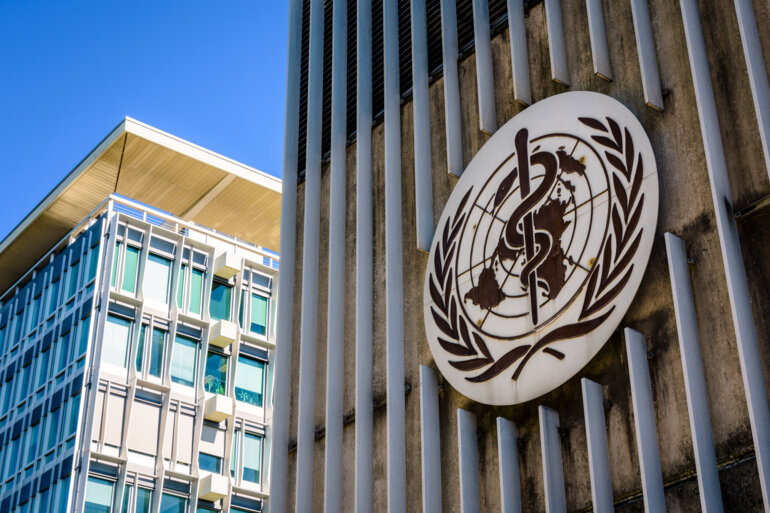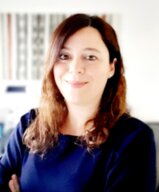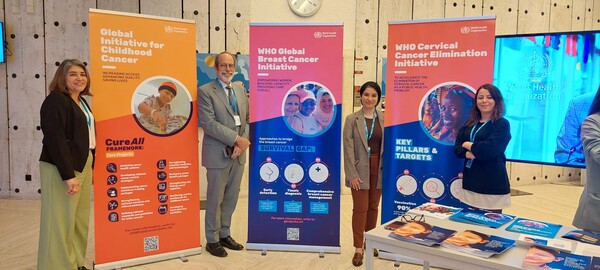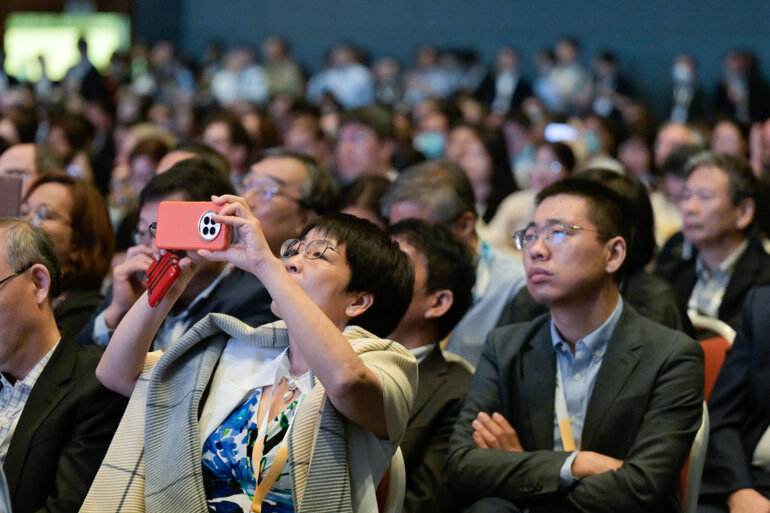Dr Raffaella Casolino is the third ESMO young medical oncologist serving as a cancer expert on the WHO Cancer Control team
The right person, the right place, the right time. This is how Dr Raffaella Casolino describes the present chapter of her professional life, that has brought her to Geneva, Switzerland. Here, Casolino is serving as staff member of the World Health Organization (WHO) Cancer Control team, working on several global cancer initiatives aiming to support countries in the achievement of the goals of the 2017 World Health Assembly Cancer Resolution and Universal Health Coverage.
A “rare chance”, as she says, in the traditional training journey of a young medical oncologist, made possible through ESMO’s status as a Non-State Actor (NSA) in official relations with the WHO: attendant work to foster a dialogue between oncology and global health.
“ESMO has shaped my professional trajectory so far with educational resources, networking opportunities, and inspiring models, and I am really honored it selected me as a bridge between the two organizations”, said Casolino in occasion of the World Health Assembly (21-30 May 2023), the first she attended as a WHO staff member contributing to bring key oncology issues to a global round table discussion.
How does your daily working routine at WHO office differ from what you were used to doing in clinics or research laboratories?
While my routine at WHO may not involve direct patient care or laboratory experiments, it focuses on shaping policies, developing guidelines and promoting evidence-based approaches to improve global health outcomes. The dynamic nature of the role requires adaptability, multitasking and a commitment to staying abreast of the latest developments in public health and policy in addition to staying updated on clinical and research advances. Overall, working at WHO provides an opportunity to contribute to global health priorities, collaborate with diverse stakeholders and influence policy decisions that have far-reaching impacts on populations around the world. In essence, your patient is not the individual patient but the global population. A completely different perspective, I would say.
Beyond my regular activities which include conducting research, reviewing scientific literature and analyzing data related to specific public health issues in oncology, I also participate in international conferences, high-level meetings with government officials, international organizations, or advocacy groups to promote public health agendas and secure support for policy implementation. Active participation in such events helps foster collaborations, exchange ideas, and stay updated on the latest developments in the field. This is, for example, what happened during the World Health Assembly in Geneva, an intense week of briefings, speeches, meetings from early morning until late at night, and an incredible occasion to build trust, strengthen existing alliances and create new networks and partnerships.
You have been involved in several public policy initiatives at ESMO as well as at the university while you were doing research in precision and translational oncology. How did your commitment to public policy come about?
During the first year of my medical school, a young assistant professor gave a lecture on the importance of addressing the root causes of health issues through policy interventions. The lecture emphasized, through a practical example, that merely treating patients with cholera in remote areas of Africa by investing in human and economic resources would be futile if the source of the problem - contaminated water - was not addressed through policy interventions. The general message was that while providing medical treatment is crucial, it is equally vital to tackle the underlying factors that contribute to the problem in the first place. This simple example has strongly influenced my approach to medicine.
My commitment to health policy stems from a desire to make a positive impact on society and address pressing issues that affect people's lives. I truly believe in the key role of the medical community in the protection of human rights. Health is a human right. And nowadays, the determinants of health are strongly influenced by social injustice. This means that we can make incredible scientific progress, but if we do not make the benefits of this progress available for every patient, regardless of their nationality, gender identity, education, socioeconomic level, ethnicity or religion, we have failed not only as a medical community, but also as a civil society.
My first published article focuses on the medical community’s role in human rights (Lancet. 2019 Jun 8;393(10188):2299-2300) and, over the years, I have been involved in several public policy initiatives at ESMO as well as at the university, and my interest in health policy has progressively increased in parallel with my professional growth in clinic and research areas. I am now leading a Lancet Oncology Commission in Precision Oncology and Cancer Omics, working with other colleagues at ESMO, which aims at providing evidence-based recommendations to inform policy changes to improve equitable access to effective and sustainable precision cancer care along with enhanced data collection and data sharing.
How can an active role in policy and a career in clinical work and research be managed in parallel?
Careful planning and a strong commitment to learning are essential to navigate multiple responsibilities and integrate the work in both domains. It can be challenging, but also extremely rewarding. Policy requires a different skill set compared to clinical practice and research, and developing competencies in areas such as health economics, advocacy and stakeholder engagement is essential.
The positive aspect is that, in this way, you can obtain a comprehensive understanding of the “big picture”, and a broader perspective on global oncology issues that can inform clinical and research priorities and improve the translation of evidence-based findings into policy and practice.
Of course, there are also some drawbacks. In some cases, combining policy with clinical and research careers may not fit into traditional career pathways. If you want to pursue this combination you may need to explore non-traditional opportunities and be very flexible. The other problem is that current educational curricula and training usually do not include public policy for medical oncologists. As a consequence, you need to learn a lot by yourself, outside academia.
How do you feel this opportunity at the WHO will impact your professional growth?
This experience can help shape a professional profile that is actually very rare in the oncology landscape. I feel very lucky to work under the leadership of an incredible expert in global oncology such as André Ilbawi, Technical Lead for WHO's Cancer Control Programme, who is guiding me in this journey, and I am also extremely lucky to be surrounded by amazing colleagues both within Geneva and the wider ESMO family.
I think that after this year at the WHO I will have greater and broader opportunities, and I will be in a privileged position of making the best choice for my future. My career goals are changing, they might not be the same as six months ago. This is an important message I would like to share: academia is only one of the options available. It is important to be open to alternatives, believe in yourself, and listen to your internal voice, although sometimes it is distorted by external influences and noises. It is important to find the time to switch everything else off and listen to yourself. Last July, after the end of my PhD, I was waiting for a position in Glasgow, but due to bureaucratic issues, it took a bit longer than expected. It was during that 3-month break that I had the opportunity to reflect on what I really wanted to do next. And the answer came to me: I read about the WHO position advertised in the ESMO Society Newsletter - and here I am.
What are the main challenges the oncology community has to face today at a policy level?
Nowadays, we have many effective preventative and therapeutic strategies, but they are not accessible for the majority of patients due to societal hurdles resulting in major health disparities both between and within countries. Up to 70% of cancer incident cases and mortality occur in low- and lower-middle income countries, and in high-income settings where socioeconomic status and education is poor. Social injustice kills more than the disease of cancer itself. And here is where public policy comes in to break those barriers that prevent the full realisation of cancer prevention programmes and care opportunities.
As Technical officer of the WHO Cancer Control team, I am collaborating on national cancer control plans for several countries. My focus is on delivering WHO cancer projects assisting national governments in their decision-making process on including essential cancer services in their country’s health benefit packages and developing tools that allow Member States to implement cost-effective cancer services in their national Universal Health Coverage packages to strengthen cancer prevention and control in their countries.
There are many challenges that the oncology community has to face today at a policy level. The need, for example, of healthcare infrastructure development, or the necessity to expand health insurance coverage, increase the availability of workforce, and implement strategies to reduce financial barriers to care. Also, the high price of many novel therapies makes them inaccessible to a significant portion of the global population, so it is urgent to explore innovative pricing models, promote competition, and facilitate the development of affordable generic alternatives to ensure that patients can access treatments without financial hardship. As part of my activity, I have been involved in the review of the applications for the 2023 WHO Essential Medicines List (EML) for cancer and I represented the cancer team at the meeting of the Expert Committee on the Selection and Use of Essential Medicines to be included in the 2023 EML.
Looking ahead to the immediate future, these priorities should be addressed through multi-sectoral efforts and international collaborations. The partnership between ESMO and the WHO, and the incredible work they are delivering together, is a good example of such cooperation. It is only thanks to policy interventions that we can improve cancer control and the lives of millions of people around the world by ensuring equitable access to quality cancer care and fostering advancements in research. I am humbled and honored to be able to contribute to this process.









